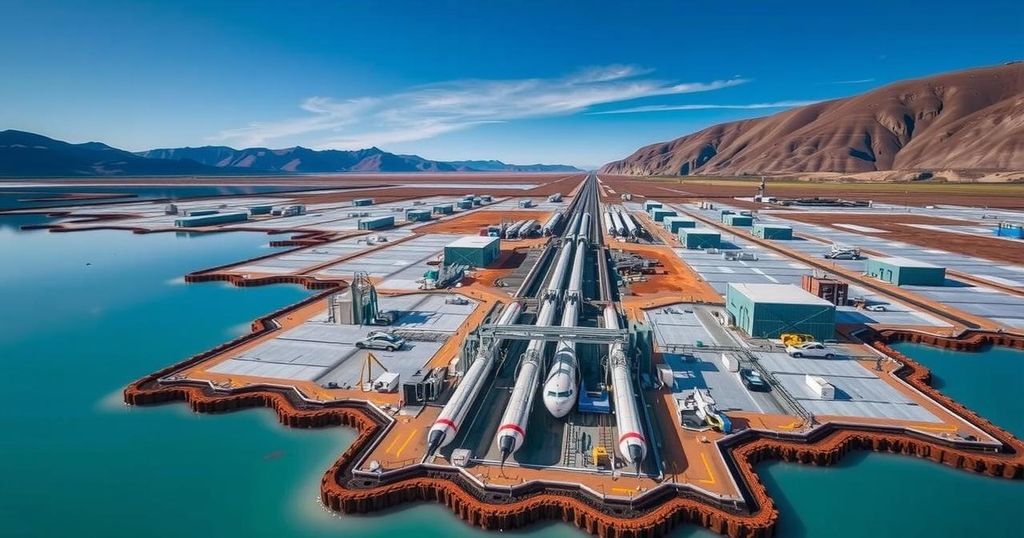Bolivia Secures $1 Billion Lithium Development Deal with China’s CBC

Bolivia has signed a $1 billion deal with China’s CBC to build two lithium carbonate plants in the Uyuni salt flats. The plants will utilize direct lithium extraction technology and aim to produce 35,000 metric tonnes of lithium annually. President Luis Arce called it a milestone, despite potential hurdles, including the need for parliamentary approval before the 2025 elections. This follows earlier agreements with Russia for lithium production, highlighting Bolivia’s ongoing quest for foreign investment to leverage its vast lithium resources.
Bolivia has formalized a significant agreement worth $1 billion with China’s CBC, a subsidiary of the influential battery manufacturer CATL, to construct two lithium carbonate plants situated in the Uyuni salt flats. Announced on November 26, this venture indicates Bolivia’s strategic intent to enhance its position in the global lithium marketplace, even as it faces historical challenges in harnessing its abundant lithium reserves.
The anticipated plants are designed to collectively yield 35,000 metric tonnes of lithium each year, employing state-of-the-art direct lithium extraction (DLE) technology that promises swifter and more sustainable production processes. Bolivia’s state-owned enterprise, YLB, is set to retain a majority 51% interest in this initiative, thereby safeguarding national control over its resources.
President Luis Arce characterized the agreement as a foundational step in Bolivia’s aspiration to emerge as a forerunner in the global lithium sector, noting its potential to influence global lithium price dynamics. Nevertheless, this ambition is tempered by political and logistical impediments. The project necessitates parliamentary endorsement, and the fragmented nature of Bolivia’s legislature could hinder progress, especially with electoral contests approaching in 2025.
This latest arrangement follows a previous $976 million deal established earlier in the year with the Uranium One Group, owned by Russia’s Rosatom, also centered around DLE technology. This partnership intends to produce 14,000 tonnes of lithium yearly. Last year, both Uranium One and CBC, alongside Citic Guoan Group, were selected to initiate pilot DLE projects in Bolivia, with the objective of subsequently scaling up to more extensive industrial operations. The Bolivian government aims to export 50,000 tonnes of lithium carbonate equivalent annually.
However, the dependency on Chinese and Russian investments poses potential risks for Bolivia’s prolonged economic resilience and geopolitical stability. While these alliances offer immediate funding and superior technology, they may constrict Bolivia’s command over its resources, binding it to the strategic motivations of its foreign partners. Such dependencies could culminate in adverse conditions, potentially reducing local economic advantages or restricting knowledge transfer, thereby jeopardizing Bolivia’s autonomy regarding its lithium sector.
Despite possessing the largest lithium reserves globally, estimated at 23 million tonnes, Bolivia has consistently underperformed relative to regional competitors such as Chile and Argentina. Challenges stemming from inadequate infrastructure, regulatory complexities, and political turmoil have impeded progress, engendering apprehension among potential investors. Since the 1990s, the nation has grappled with bureaucratic obstacles that have thwarted industrial development. For further advancement, enterprises face the challenge of navigating intricate environmental regulations and securing legislative approval amid Bolivia’s political fragmentation and the forthcoming general elections scheduled for 2025.
Bolivia is home to the world’s most substantial lithium reserves, estimated at 23 million tonnes, which presents a considerable opportunity for economic development. However, the country has faced persistent obstacles in realizing this potential due to years of bureaucratic inefficiencies, infrastructure deficits, and political unrest. The current geopolitical landscape has shifted, leading Bolivia to engage in partnerships with foreign entities, particularly from China and Russia, in an effort to accelerate its lithium production. The government’s dual strategy of leveraging foreign investment while attempting to maintain local control over resources presents a complex dynamic that influences its path forward in the global lithium market.
In summary, Bolivia’s $1 billion agreement with China’s CBC represents a strategic commitment to establishing its dominance in the lithium sector. While this deal could position Bolivia as a significant player in the global market, it also raises critical concerns regarding political stability, economic independence, and long-term sustainability. The interplay between foreign investment and national interests will be crucial as Bolivia navigates the challenges of advancing its lithium industry while ensuring it benefits its populace and retains control over its resources.
Original Source: www.intellinews.com








